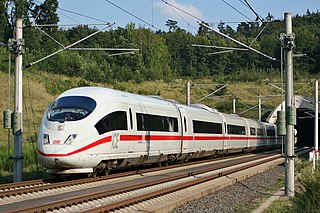EMU, as an initialism, may refer to:
EMU, as an initialism, may refer to:
An economic and monetary union (EMU) is a type of trade bloc that features a combination of a common market, customs union, and monetary union. Established via a trade pact, an EMU constitutes the sixth of seven stages in the process of economic integration. An EMU agreement usually combines a customs union with a common market. A typical EMU establishes free trade and a common external tariff throughout its jurisdiction. It is also designed to protect freedom in the movement of goods, services, and people. This arrangement is distinct from a monetary union, which does not usually involve a common market. As with the economic and monetary union established among the 27 member states of the European Union (EU), an EMU may affect different parts of its jurisdiction in different ways. Some areas are subject to separate customs regulations from other areas subject to the EMU. These various arrangements may be established in a formal agreement, or they may exist on a de facto basis. For example, not all EU member states use the Euro established by its currency union, and not all EU member states are part of the Schengen Area. Some EU members participate in both unions, and some in neither.
Ev or EV may refer to:
MU, Mu or μ may refer to:
EPA most commonly refers to the United States Environmental Protection Agency.

A multiple-unit train or simply multiple unit (MU) is a self-propelled train composed of one or more carriages joined, which when coupled to another multiple unit can be controlled by a single driver, with multiple-unit train control.
ECC may refer to:
UA usually refers to:
Ems or EMS may refer to:
EA is an initialism for Electronic Arts, an American video game company.
European integration is the process of industrial, economic, political, legal, social, and cultural integration of states wholly or partially in Europe, or nearby. European integration has primarily but not exclusively come about through the European Union and its policies.
The European Monetary System (EMS) was a multilateral adjustable exchange rate agreement in which most of the nations of the European Economic Community (EEC) linked their currencies to prevent large fluctuations in relative value. It was initiated in 1979 under then President of the European Commission Roy Jenkins as an agreement among the Member States of the EEC to foster monetary policy co-operation among their Central Banks for the purpose of managing inter-community exchange rates and financing exchange market interventions.

Martin Stuart Feldstein was an American economist. He was the George F. Baker Professor of Economics at Harvard University and the president emeritus of the National Bureau of Economic Research (NBER). He served as president and chief executive officer of the NBER from 1978 to 2008. From 1982 to 1984, Feldstein served as chairman of the Council of Economic Advisers and as chief economic advisor to President Ronald Reagan. Feldstein was also a member of the Washington-based financial advisory body the Group of Thirty from 2003.

The economy of Europe comprises about 748 million people in 50 countries.

A currency union is an intergovernmental agreement that involves two or more states sharing the same currency. These states may not necessarily have any further integration.
EPU or Epu may refer to:
As an abbreviation, AMU may refer to:

Elektrichka is a Soviet and Eastern bloc commuter (regional) mostly suburban electrical multiple unit passenger train. Elektrichkas are widespread in Russia, Ukraine and other countries of the former Warsaw Pact presenting a socially vital mode of transportation. In 2007, 4085 commuter trains a day were running on the Russian Railways network alone, most of them electric. The first elektrichka train on July 6, 1926, along the Baku–Sabunchi line in Soviet Azerbaijan. Also urban (intra-city) gorodskaya elektrichkas and airport's aeroexpresses exist in a few cities of Russia, Ukraine, and Belarus.

The euro came into existence on 1 January 1999, although it had been a goal of the European Union (EU) and its predecessors since the 1960s. After tough negotiations, the Maastricht Treaty entered into force in 1993 with the goal of creating an economic and monetary union (EMU) by 1999 for all EU states except the UK and Denmark.

The economic and monetary union (EMU) of the European Union is a group of policies aimed at converging the economies of member states of the European Union at three stages.